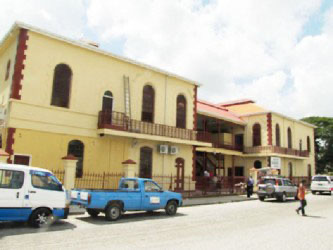Attorney General Anil Nandlall has strongly criticized the decision by a magistrate yesterday to grant bail to four men charged with the possession of guns and ammunition without licence.
A statement on his Facebook page follows:
FThe decision of a learned Magistrate in the Georgetown Magistrate Court on the 28th of May, 2021, to release on bail, on their first appearance, four men, charged with having in their possession, guns and ammunition without a license, has evoked grave concern and criticism among members of the public; and I dare say, rightfully so.
Based upon the information published in the press, one of the young men had a Glock 9mm pistol concealed in his crotch. The other three were seated in a car, in which a .32 pistol and ammunition were found concealed under the driver’s seat. From this narrative, no inference, favorable to the defendants can be drawn.
To assert that crime is a serious problem in our country, may be putting it mildly. To not recgonise that gun related crimes threaten the safety of every citizen would be a forbearance in naivety. These and similar factors are which a tribunal of law is enjoined to take into account when considering the grant or refusal of bail.
In order to circumscribe the discretion in respect of the grant of bail in relation to firearm offences, obviously due to their devastating prevalence and the accompanying societal damage, the 9th Parliament of Guyana unanimously enacted an amendment to the Firearms Act, Chapter 16:05, Laws of Guyana in the following terms:
“No person arrested for any offence under section 16, section 37 or section 38 shall be admitted to bail, unless the prosecution has had an oppourtinity to intervene and unless there are special reasons for admitting the person to bail which shall be recorded in writing and the trial shall be within reasonable time.”
From the available factual matrix, no doubt the offence for which these men are charged is captured by Section 16 of the Act. The Press reports allude to the presence of a Prosecutor in Court. However, there is nothing in the news narrative to suggest the presence of ‘special reasons’ which would have rendered the defendants admission to bail, possible.
The term ‘special reasons’ has been judicially interpreted and thereby confined to relate to the ‘offence’ and not the ‘offender.’ Based upon the facts elucidated in the news report, it is impossible to conceive what would have constituted ‘special reasons’, thereby enabling the learned Magistrate to admit these persons to bail. It is my hope that the statutory prescription was complied with and those ‘special reasons’ were recorded in writing.
As the Executive Officer of the State under whose responsibility the Justice Sector falls, I can relate to both the public’s concern and criticism. I can also relate to the negative impact which such a decision may have on the morale of the law enforcement agencies of the State.
Perhaps the State may soon have to resort to the extreme measure of subjecting like decisions of Magistrates to judicial review in the High Court and lodge complaints with the Judicial Service Commission.






